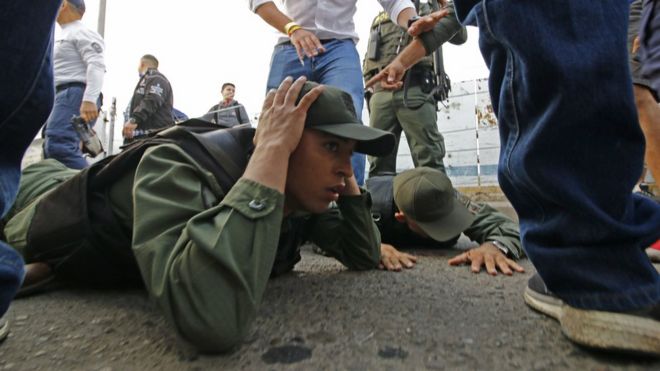Venezuela's Soldiers Leave Their Post At The Border-This is Just One Day Of Many Bad Ones to Come
 | ||
| Soldiers from the Venezuelan national guard have left their posts ahead of an opposition-led effort to bring aid into the country, Colombia's migration agency said. |
In a separate development, Venezuelan troops have fired tear gas at people looking to cross into Colombia to work.
Tensions have been rising over a row about the delivery of humanitarian aid.President Nicolás Maduro said the border with Colombia is partly closed to stop aid being delivered.
But self-declared interim president Juan Guaidó has vowed that hundreds of thousands of volunteers will help bring in the aid deliveries, which include food and medicine, on Saturday.
What's the latest?
Local media report people jumping the barricades to cross the border at the Venezuela-Colombia border, while opposition MPs have posted defiant messages on social media denouncing the use of force.
The BBC's Orla Guerin, on the Colombia border, said Venezuelans were begging soldiers to be allowed to cross.
Reporters at the scene have announced Mr Guaidó's arrival at the Tienditas bridge on the Colombian side of the border. He was accompanied by the country's president, Iván Duque.
Mr Guaidó urged the military to allow aid trucks to enter, calling on them to "put themselves on the side of the people".
Venezuela-Colombia border turns violent
Media captionVenezuela-Colombia border turns violent
He confirmed that "various members" of the national guard had left their posts at the Simon Bolivar International Bridge to oversee the humanitarian aid delivery.
Those who do not allow aid to pass are "deserters" who "betray" the Venezuelan people, he added.
Three have abandoned post at this bridge, while another did so at the Paula Santander International Bridge in Ureña, in the south west of the country.
Venezuela crisis - in nine charts
Genuine aid or a Trojan horse?
"We want to work!" people chanted as they faced riot police at the Ureña border bridge.
Activists there were joined by 300 members of the "Women in White" opposition group who marched in defiance of Mr Maduro's attempts to close the border.
Meanwhile, a top ally of President Maduro has suggested the government would allow Venezuelans to accept aid "at their own risk", but that no foreign soldiers would "set foot" inside Venezuela.
Earlier on Saturday, two people were killed by Venezuelan forces near the border with Brazil.
"Why are you serving a dictator?"
Guillermo Olmo, BBC Mundo, Ureña, Venezuela
It's been a difficult day here on the Venezuelan side.
We found locals getting angry because they found the border was closed - these people normally make a living across the border. Then it turned ugly in Ureña.
We witnessed protesters lunging to break one of the barriers but the National Guard started firing tear gas and pellets.
People were shouting at the National Guard asking them why, in their words, they were serving a dictator and not serving their own people.
We had to run away to avoid being hurt but there is still a lot of tension in the air, with a heavy military presence everywhere.
How did we get to this point?
Humanitarian aid has become the latest flashpoint in the ongoing standoff between Mr Maduro and Mr Guaidó.
Mr Guaidó, who is the leader of the country's opposition-dominated National Assembly, last month declared himself the country's interim leader.
He has since won the backing of dozens of nations, including the US. He has called the rule of President Nicolás Maduro constitutionally illegitimate, claiming that Mr Maduro's re-election in 2018 was marred by voting irregularities.
Venezuela is in the grip of a political and economic crisis. The country's inflation rate has seen prices soar, leaving many Venezuelans struggling to afford basic items such as food, toiletries and medicine.
Mr Guaidó insists that citizens badly need help, while Mr Maduro says allowing aid to enter is part of a ploy by the US to invade the country.
About 2.7 million people have fled the country since 2015.
Media captionBattle of the concerts held on either side of the Venezuela-Colombia border.
BBC
Comments